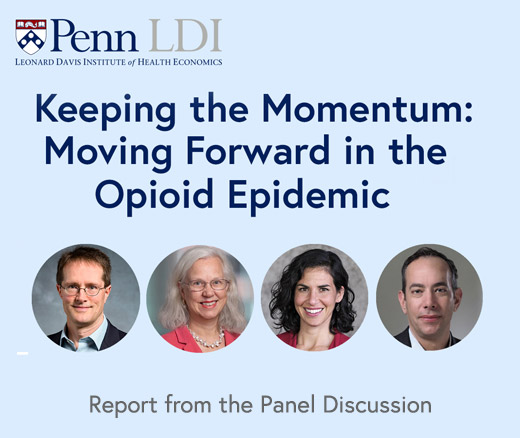
Experts Warn Addiction Policy is Weak Despite Falling Overdose Deaths
Penn LDI Panel Urges Family-Focused Strategy and Stronger Health System Response
Blog Post

Three hundred dollars per month for staying smoke-free. A $50 gift card for walking daily. These are examples of effective financial incentives, according to new work by Penn LDI experts.
Monetary incentives have been widely used by public health entities, insurers, and health systems to drive lifestyle change and behaviors that can improve health. Penn LDI Fellows Harsha Thirumurthy and Karen Glanz assessed evidence from 39 reviews published over the past 15 years. They examined reviews covering more than 600 studies of incentive-based interventions across four health behaviors: physical activity, smoking cessation, vaccination, and medication adherence.
The studies covered a wide range of populations and contexts worldwide, though the bulk of the evidence comes from high-income countries. The authors’ synthesis concludes that financial incentives tend to produce modest, often short-lived improvements. Incentives are most effective when the amounts offered are large and delivered promptly. The authors note that it is sometimes difficult to disentangle the effects of financial incentives from those of other intervention and measurement components, such as physical-activity tracking devices or vaccination mandates.
Here are five takeaways from the research:
The most consistent evidence of the effectiveness of financial incentives is for smoking cessation and, in the short term, for physical activity. Although effects on vaccination have generally been positive, findings for medication adherence are more mixed.
In several studies, lottery incentives were less effective than fixed incentives for changing habitual behaviors.
The timeliness and frequency of incentive delivery, such as immediate versus delayed rewards and recurring versus one-time rewards, influence behavior change.
There is limited evidence of habit formation or behavioral internalization once incentives end; however, there are important exceptions, such as for smoking cessation. A promising approach may involve pairing incentives with habit-building strategies, phased tapering, or other approaches, such as gamification.
For example, low-income, pregnant smokers or people with substance use disorders are groups where the incentives have been successful. Furthermore, in trials conducted in low- or middle-income countries, relatively small financial incentives can represent a large share of income and therefore be more effective than in high-income countries.
The next steps in further understanding the most effective approaches to financial incentives, according to the authors, are to examine the long-term effectiveness of incentives when they continue over time, better understand the mechanisms of change, and explore the effectiveness of non-financial and social incentives.
The study “Effectiveness of Financial Incentives for Health Behavior Change: A Narrative Review and Analysis” appeared in The Annual Review of Public Health on December 23, 2025. Authors include Karen Glanz, Harsha Thirumurthy, and Natasha Agnes D’cruze.


Penn LDI Panel Urges Family-Focused Strategy and Stronger Health System Response

Remote Nurses Improved Quality Slightly but Can’t Replace Nurses at the Bedside, a New Study Finds

Washington State’s First-in-the-Nation Insurance Plan Begins Payouts in Mid-2026, and Researchers Will Weigh its Effect on Care, Costs, and the Long-Term Care Markets

Without Pressure From Congress, NHANES — Which Helped Uncover High Levels of Childhood Lead, Nutritional Deficiencies, and Forever Chemicals — Will Cease to Exist

A Multi-State Study Finds That Parents Often Travel 60+ Miles—With Distance, Insurance, and Race Driving Gaps in Maternal Care

Former CMMI Leader Liz Fowler Cites Rigid Federal Scoring Rules and Bureaucratic Impatience for Pilot Failures